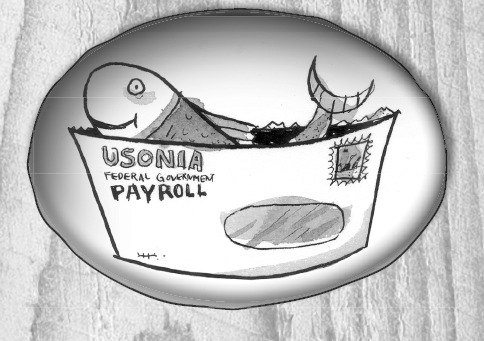
In the beginning, the island had no government... compensation at least for the limited diet. Able, Baker and Charlie were old friends and worked out disputes amicably. But as simple societies grow more complex, there inevitably arises the need for some central authority.
With more people on the island, misunderstandings multiplied. When words failed to settle the matter, spears were often employed to bring about a resolution.
With no organized mutual defense apparatus, occasionally gangs of fish filchers would go on a rampage and make life miserable for the islanders.
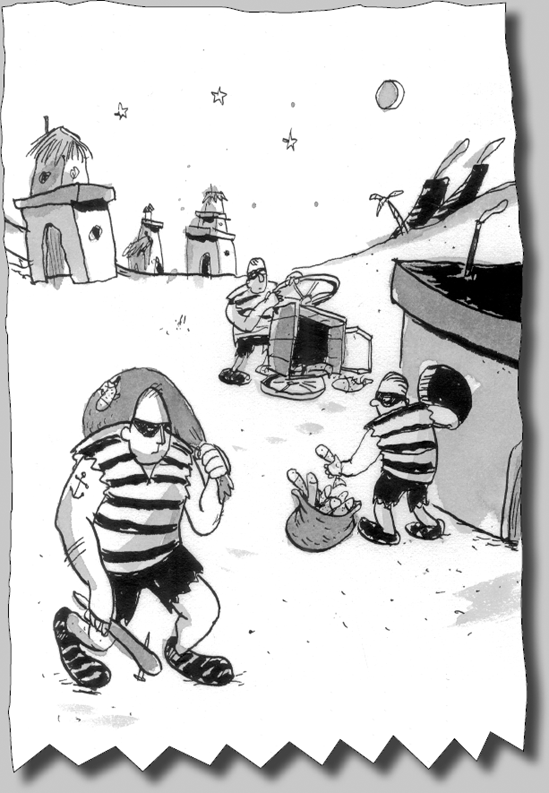
Every now and then the island would be invaded by the Bongobians, who in addition to being great drummers were also fierce plunderers. When the Bongobians got their mojos working, no saved fish were safe.
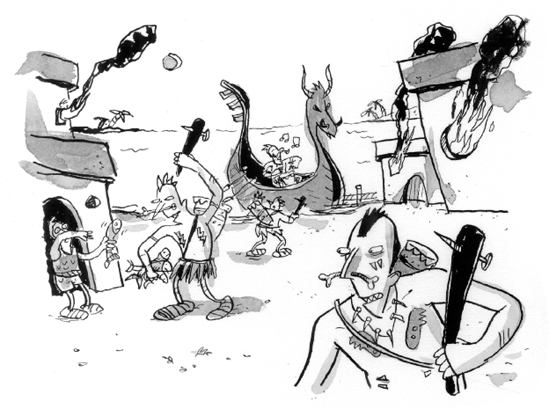
It was evident that the islanders needed to band together for mutual protection and security. They needed some leadership. But handing out power is always a risky business. Once given, power is almost always abused.
After experimenting with a variety of vainglorious chieftains and other losers, the islanders decided to put together a government that would be accountable to the people and would be limited in its ability to take away the freedoms that had brought the island its prosperity in the first place. It was decided that the islanders would elect 12 senators, including a senator-in-chief with executive authority.
To protect the island from hostile invasion, the senate would create and oversee a navy of spear-packing war canoes.
To promote social stability, and to protect every islander's rights to life, liberty, and property, the senate would establish a system of courts to settle disputes, and a police squad to enforce the decrees of the judges.
And to promote commerce, the senate would build and maintain a series of lighthouses to protect sea traffic from the island's treacherous cliffs.
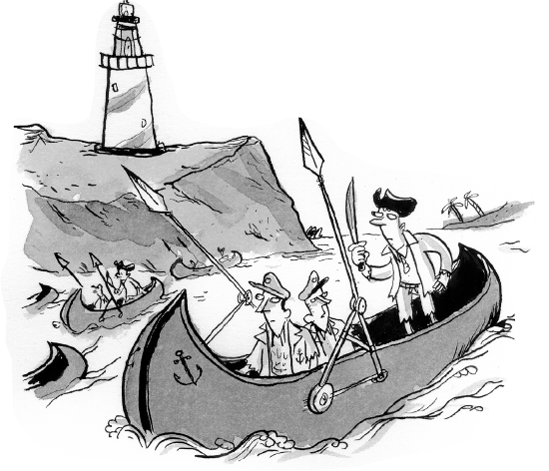
In order to finance this modest apparatus, the islanders agreed to pay a yearly fish tax. All the fish sent in to the government would go into a special government account at the bank. The senate would draw on these funds to meet its expenditures.
But as the island was populated by fiercely independent citizens, many were wary of investing too much power in too few hands.
In order to ensure that the senators did not play fast and loose with the island's fish taxes, a constitution was drafted that clearly authorized certain powers to the senate. Powers not mentioned were reserved to the people alone. Just in case there was any confusion as to what the senate could and could not do, a supreme judge was put in place to enforce the constitution and maintain a check on the political ambitions of senators.
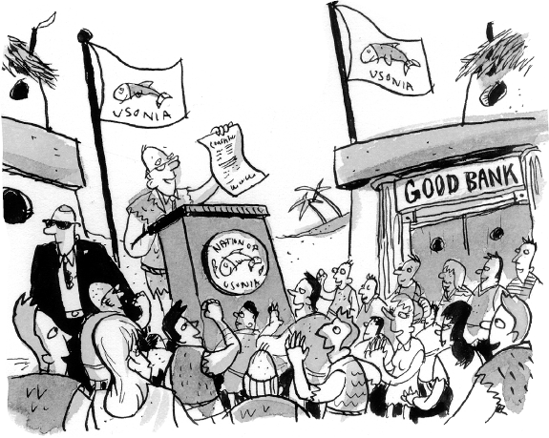
When the constitution was voted on and passed, the island nation was dubbed the Republic of Usonia.
The new government wisely decided to not spend all the fish it raised in taxes. The reserves could come in handy in case an unexpected monsoon temporarily sapped the island's ability to fish or if the Bongobians launched a new and more elaborate raid.
And although the government did keep a number of people on its payroll—lighthouse keepers, constables, judges, and navy paddlers—everyone understood that those jobs could exist only because the government taxed society's producers. If producers didn't send in fish, the government employees couldn't eat.
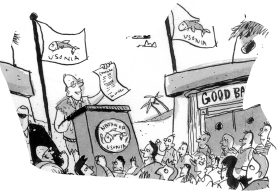
So far, so good. But there's always something...
It's a shame how few modern Americans really understand how our country was founded on a radical experiment in strictly limited government. Steeped in the transformative philosophies of freedom, reason, and science that flourished in the seventeenth and eighteenth centuries, the Founding Fathers sought to create a completely new relationship between people and government, whereby sovereignty rested with the individual, whose rights where inviolable.
In the early days after the War of Independence, in exchange for the establishment of a national government, which many Americans did not want, the U.S. Constitution was conceived as a masterfully designed cage that would prevent the "beast" of government from running amok. The Constitution not only protected people from government, but it also protected minorities from the tyrannies of majorities.
The Constitution deliberately sought to segment powers in the different branches of the federal government to decentralize authority into the many states, and most importantly to prevent the federal government from taking any power it decided to take.
The result was a nation where individuals could be secure in their personal liberty and possessions, and who were not prevented from disposing of their assets in any way they saw fit. The fact that these rights, unfortunately, did not apply to all inhabitants of the new country, does not diminish the audacity of the idea, which had never previously been codified in any other country.
Over time, that clarity of vision has been blurred. In times of crisis enough people become convinced that government needs more power and that people can get by with fewer liberties. In our current economic crisis, this trend has unfortunately gathered a great deal of steam.
In our desire to make the pain of economic contraction go away, we have forgotten that freedom involves risk. If government is obligated to cure all hardships, then no one is really free in the first place. Take away the freedom to fail and you have obliterated the freedom to succeed.
